
Travelers in Quarantine: When We Stayed Home
Four travel writers reflect on life while sheltering in place.
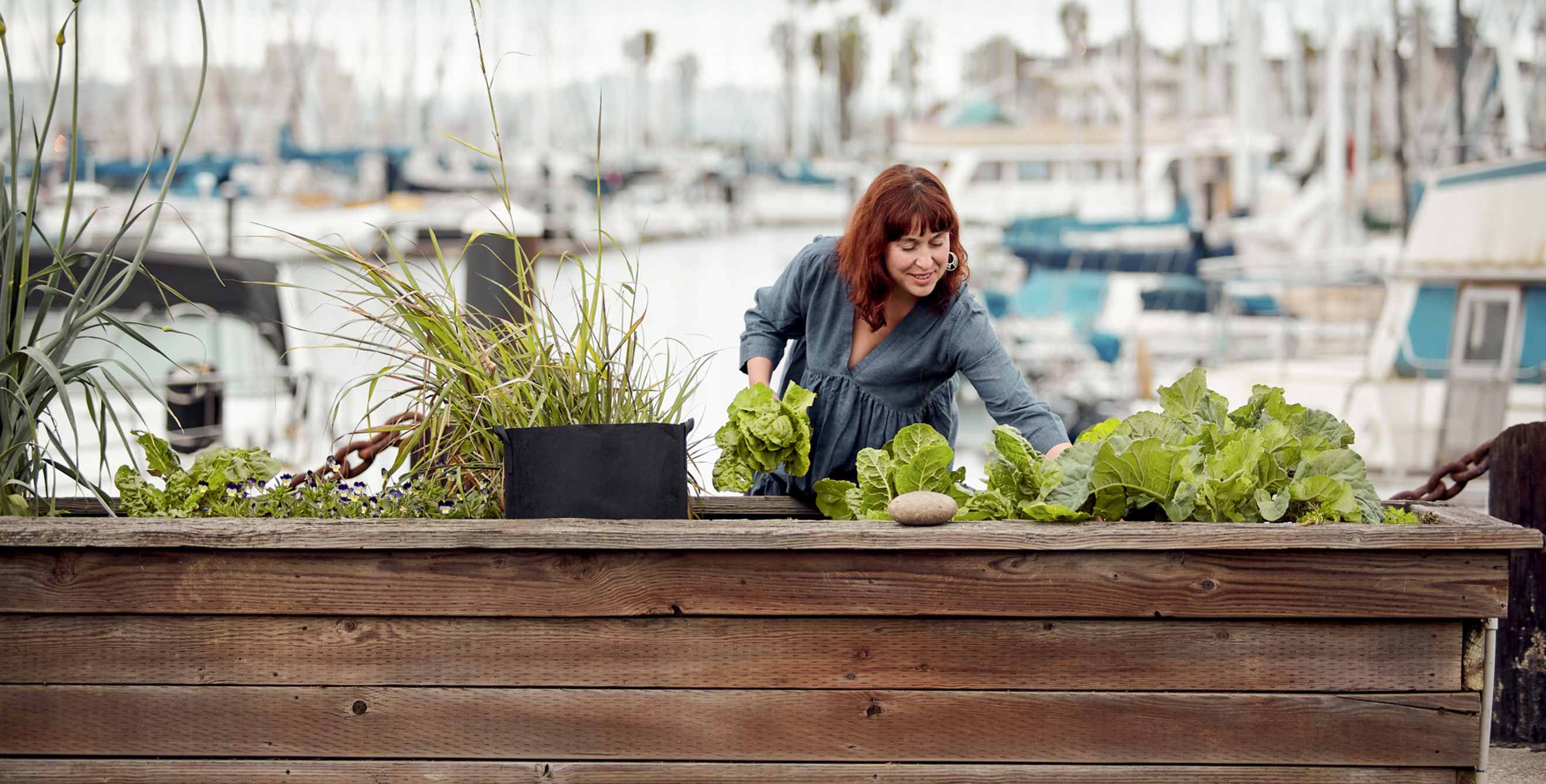
Panic Gardening With Freda Moon
There was a moment in March, when others were panic buying, that I began panic gardening.
During my 20s and early 30s, I moved a lot and traveled more. When my husband and I moved—from Santa Cruz to Chicago, New Haven to Nicaragua, Mexico City to New York—we sold our things and started over. We were rootless. I loved it.
When we eventually decided to have kids, we returned to California, bought a boat, and began living on San Francisco Bay—an unmoored version of "settling down" that brought us closer to family, if not significantly closer to staying put. Our travel changed, but it didn't stop. Both our kids had visited half a dozen countries before they could walk. But there were downsides to all this adventure. "Home" never felt like more than a stop on our itinerary.
Then Covid-19 came to California and forced me, like everyone else, to stay. To shelter. Facing an uncertain future, without either travel or work, my impulse to garden felt instinctual, like an inheritance from my grandmothers, who had lived through Depression-era poverty and a world war. The tactile satisfaction of gardening—hands in manure-rich soil, plucking weeds, wrangling snap pea vines and tomato branches—was calming. It was also a commitment. It wedded me to Alameda, the island city where we'd lived for years but never truly dug in.
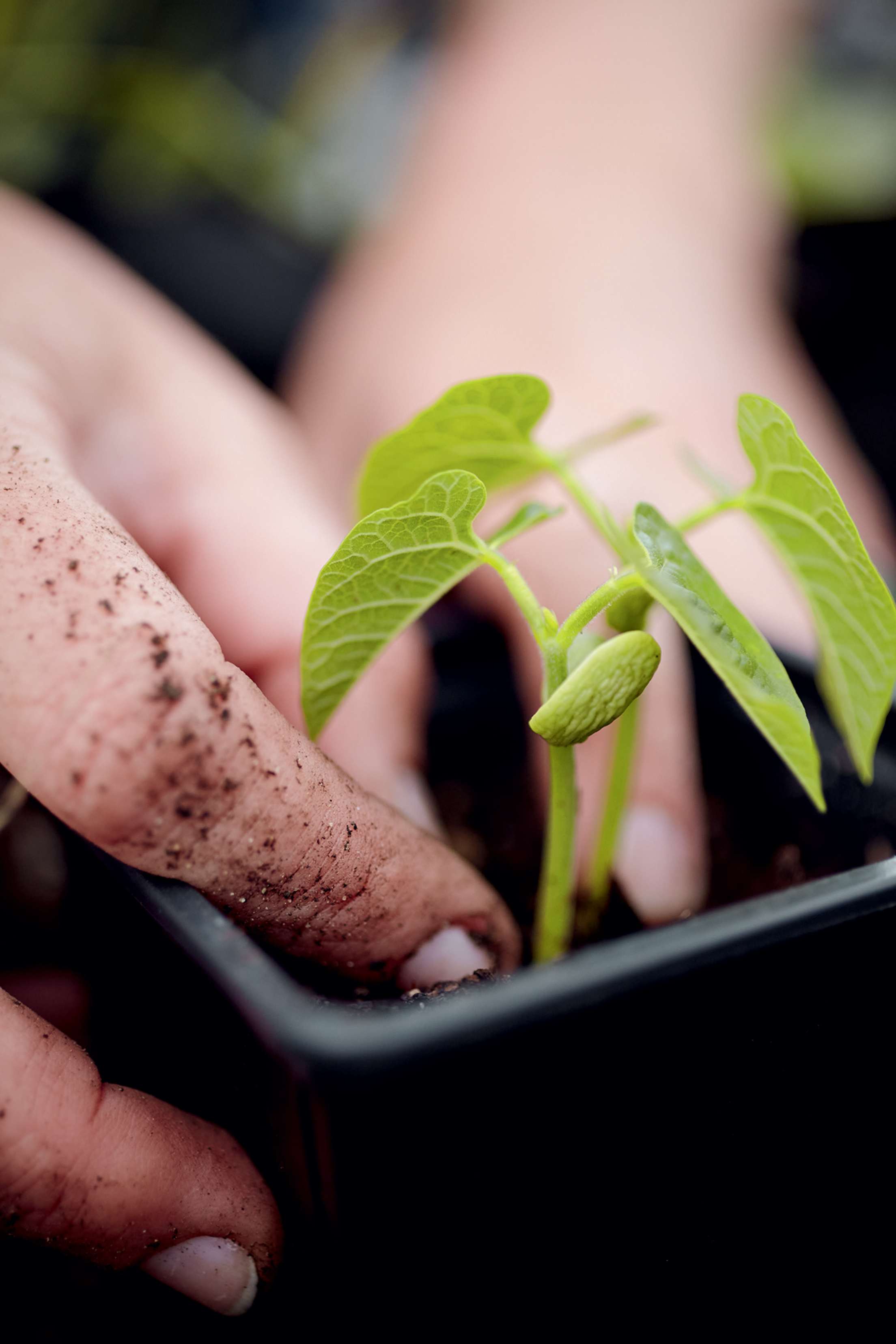
For Moon, growing food also means sharing food with others.
In our marina's parking lot, I took over raised flower beds, badly neglected, and converted them to vegetable gardens of kale, collard greens, chard, and carrots. I turned our roof deck into a lettuce and herb farm and hung a hammock to remind me of my last trip to southern Mexico. I was supposed to return there in April for an assignment that is now on indefinite hold.
I planted more than we could eat, then kept going. I wanted to have extra so we could feed others. I knew in my gut that people would be hungry. So I grew scallions and potatoes from kitchen scraps. I began baking, making sourdough pizza and biscuits from wild yeast. We got a waffle maker and an ice cream churn, single-use gadgets of the sort I've resisted keeping in our small space. I made extra of everything and gave away as much as I could, finding purpose in feeding people.
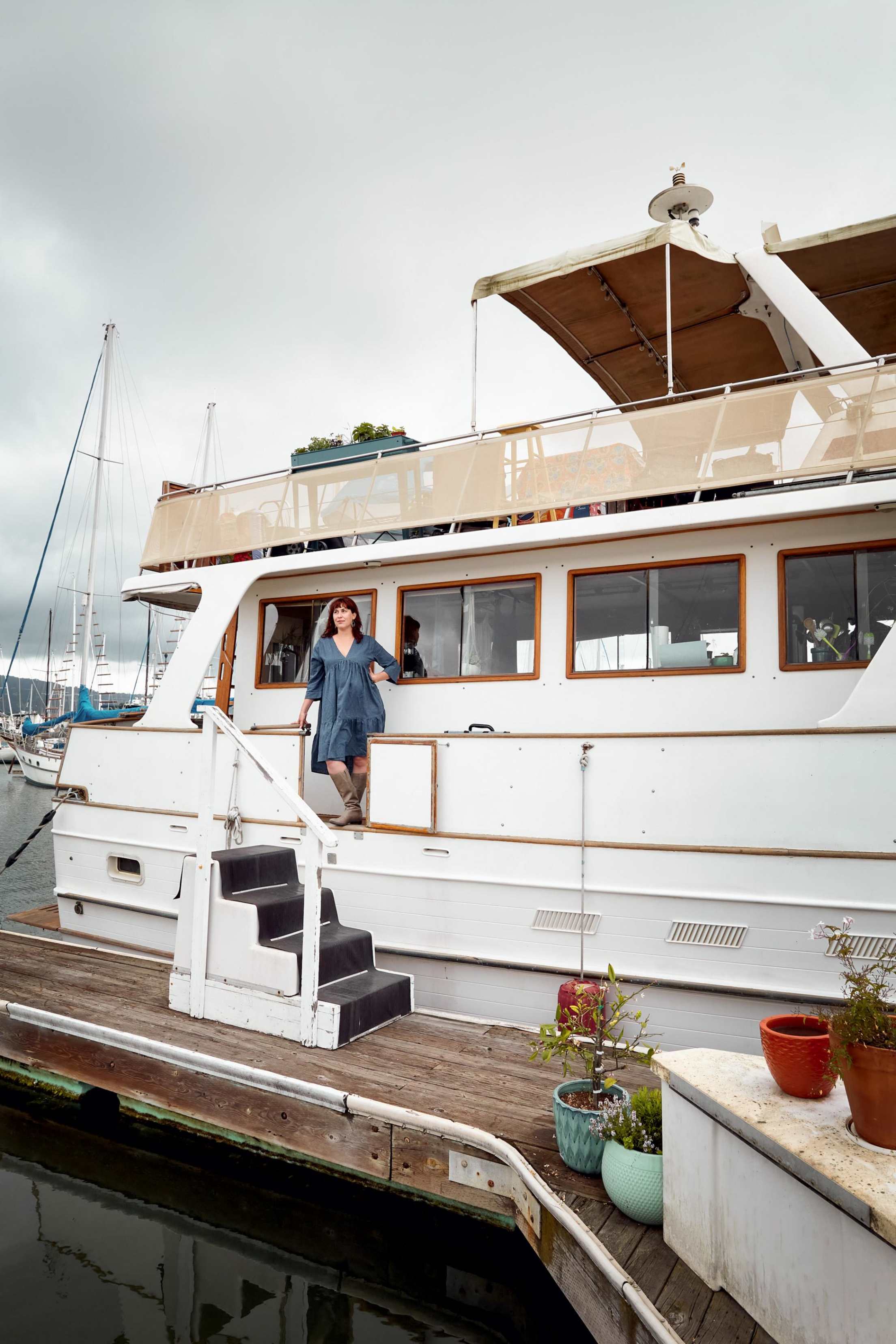
Moon has been sheltering in place in her family's boat on San Francisco Bay.
I packed a ziplock bag of waffles and sent my husband and daughter kayaking along the shore with a special delivery for a friend a few marinas away. I stood in my garden, mask on, handing out extra greens to strangers, neighbors I am only now getting to know. In return, I received unexpected gifts: a painted rock that reads SMILE; a small pot with a young bean stalk, ready to plant; knitted mask clips to make my 5-year-old more comfortable in her Minnie Mouse face covering.
This island is now our whole world, so why not make it a world overflowing with flavor, and color, and enough food to share with the people a pandemic has turned into a community.
Freda Moon's travel writing has appeared in the New York Times, Afar, and Sunset. She lives on a trawler in San Francisco Bay.
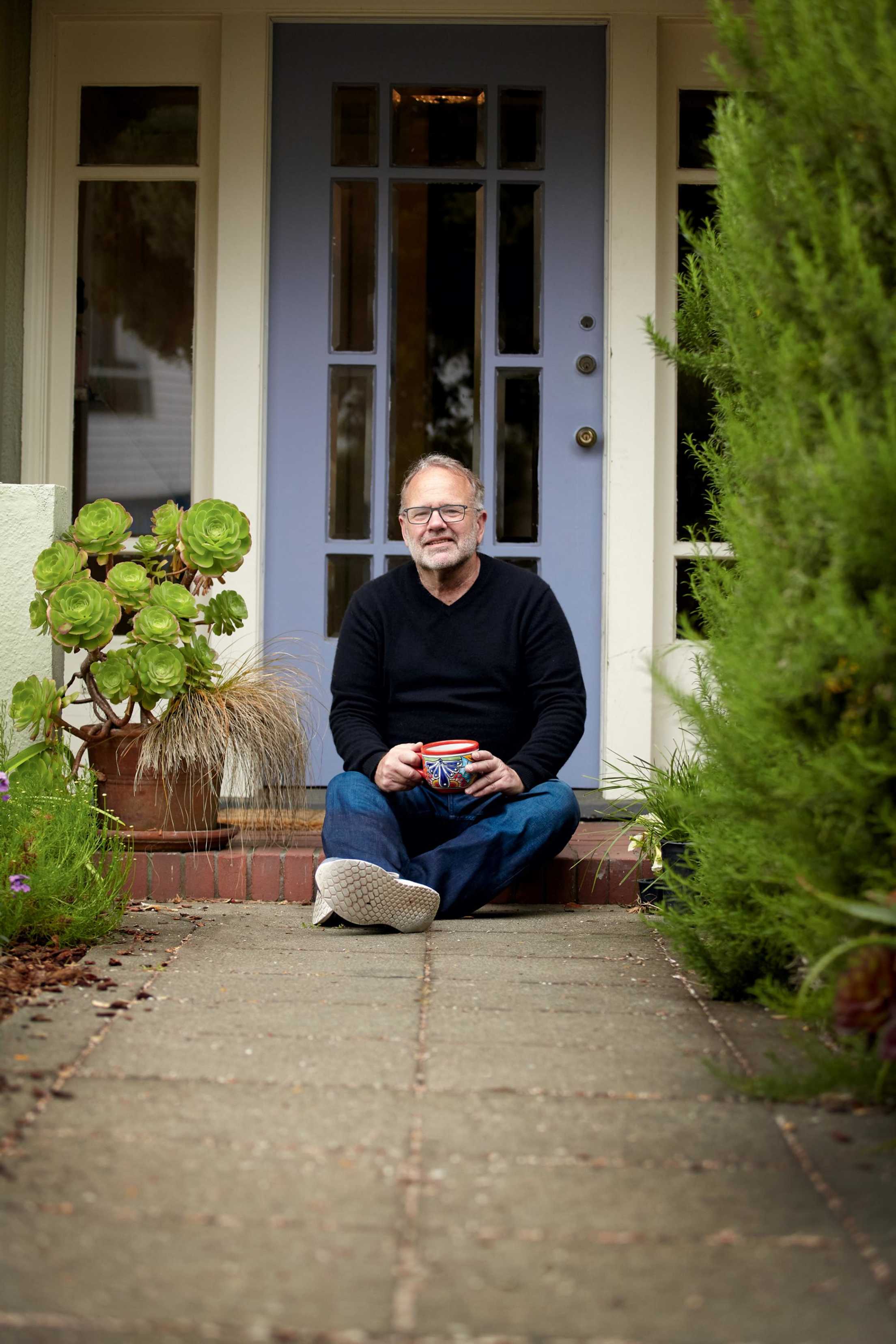
Covid-19 has given Peter Fish a chance to work on his coping strategies.
Practicing Resilience With Peter Fish
"It's not a sprint," my wife tells me. "It's a marathon."
We're on Day 20 of sheltering in place. It feels like Day 200. My wife is a social worker, gifted at coping strategies. She's devising one for me. "There's no Pandemic for Dummies," she advises. "You have to find your own resilience."
I'm trying, but it's not easy. I'm a travel writer. I've spent my life working to capture the world's wonders in words. Now, thanks to Covid-19, my world shrinks every day. I spend hours canceling long-planned trips. Goodbye, Sonoma coast. So long, Sierra Nevada. Some other time, Montana Rockies.
We are lucky, my wife and I tell ourselves five times a day. We're healthy, we have jobs, and there are few better places to be quarantined than our ocean edge of San Francisco. I can slip a leash on Maisie, our yellow Labrador, strap on my protective mask, and within minutes be strolling through Golden Gate Park. If I want something more strenuous, I lace up running shoes and—carefully maintaining a safe physical distance—pound the jogging path along a Great Highway now blissfully closed to cars.
It all feels normal, until it doesn't. Until you realize that it's Day 30 with no shelter-in-place end in sight. Worry sets in. About San Francisco: Will the bookstores, movie houses, and coffee joints that make the city the special place it is return when the virus is under control? Worry about our first-job-out-of-college son, sheltering in place in far-off New Jersey, reachable only by Zoom. Worry about the family trips we'd tentatively planned with him, to places he has yet to see—Alaska's Inside Passage, the Grand Canyon, Utah's Highway 12 and the impossibly beautiful red rock country it traverses. Will those places be out of reach forever?
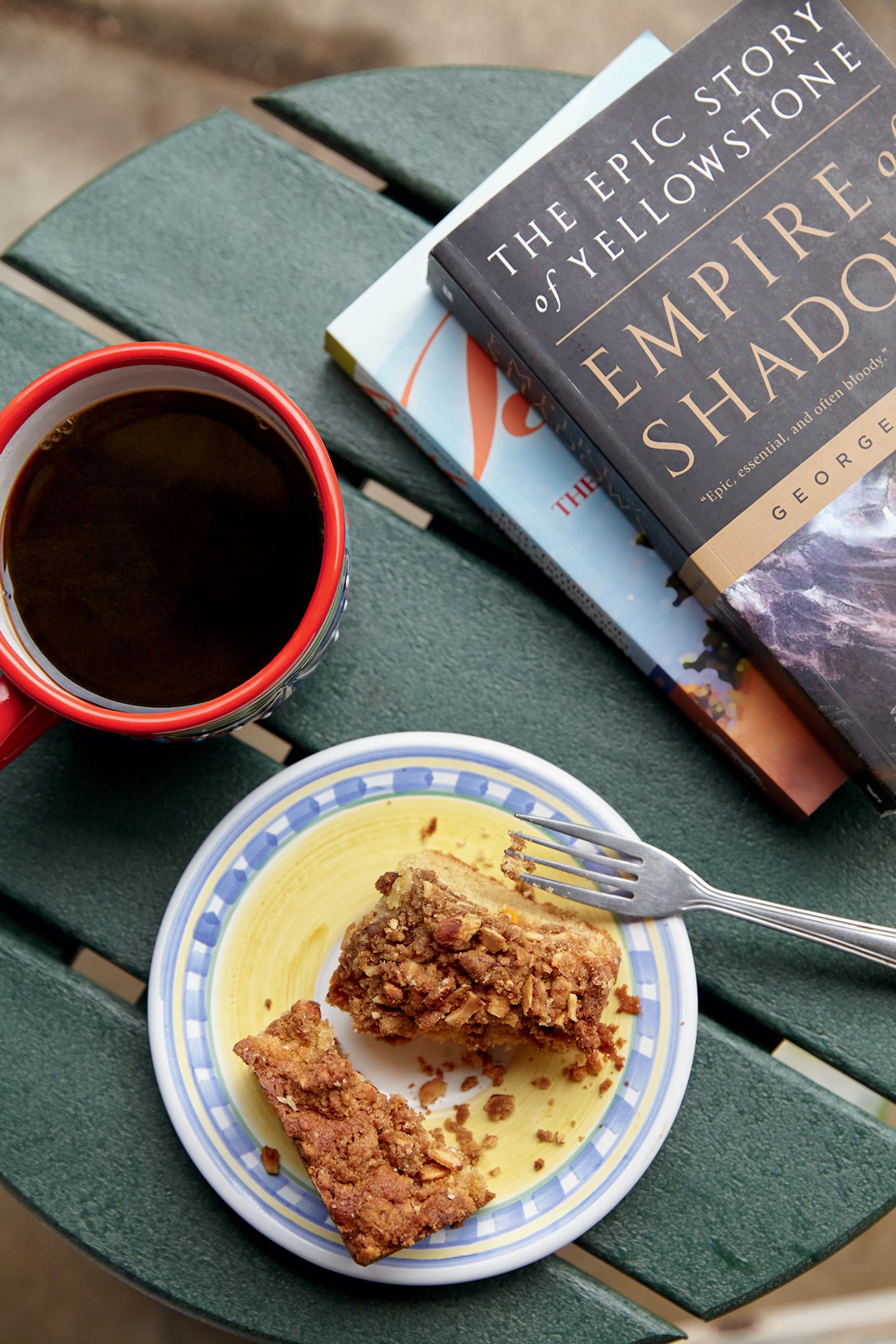
Coffee, cake, and books are the little things that comfort.
What helps? My wife, our dog, gin and tonics, and books. I can't venture out into the world, but I can read all about it. I gravitate to old friends. Mary Austin's Land of Little Rain, that poem to California's high desert where you savor "deep breaths, deep sleep, and the communion of the stars." And a newer classic, George Black's Empire of Shadows, an epic history of my favorite place in the universe, Yellowstone National Park, the kingdom of grizzlies and geysers and the chasm where the Yellowstone River cascades down canyon walls seemingly sculpted in molten gold.
With such aids, good days follow the bad. I put on the running shoes and head to the Great Highway. Another brilliant spring day—bright, breezy, with whitecaps skittering on a slate-blue sea. The path is bordered by short, decorative wooden posts. I run past one and spot something new. Nailed to the wood is a small oval blackboard on which someone has scrawled a message in white chalk. The words are blurred. I bend down for a closer look. WE WILL GET THROUGH THIS.
I stand there for a moment, warmed by spring sunshine and the message an unknown neighbor has left for the world. A marathon, not a sprint, I tell myself. We will take our son to the Grand Canyon and the Inside Passage. I will order a Cubano at my favorite neighborhood coffee joint. I resume my run. We will get through this. We will.
Peter Fish is a San Francisco–based writer whose work also appears in the San Francisco Chronicle, Coastal Living, and Sunset.
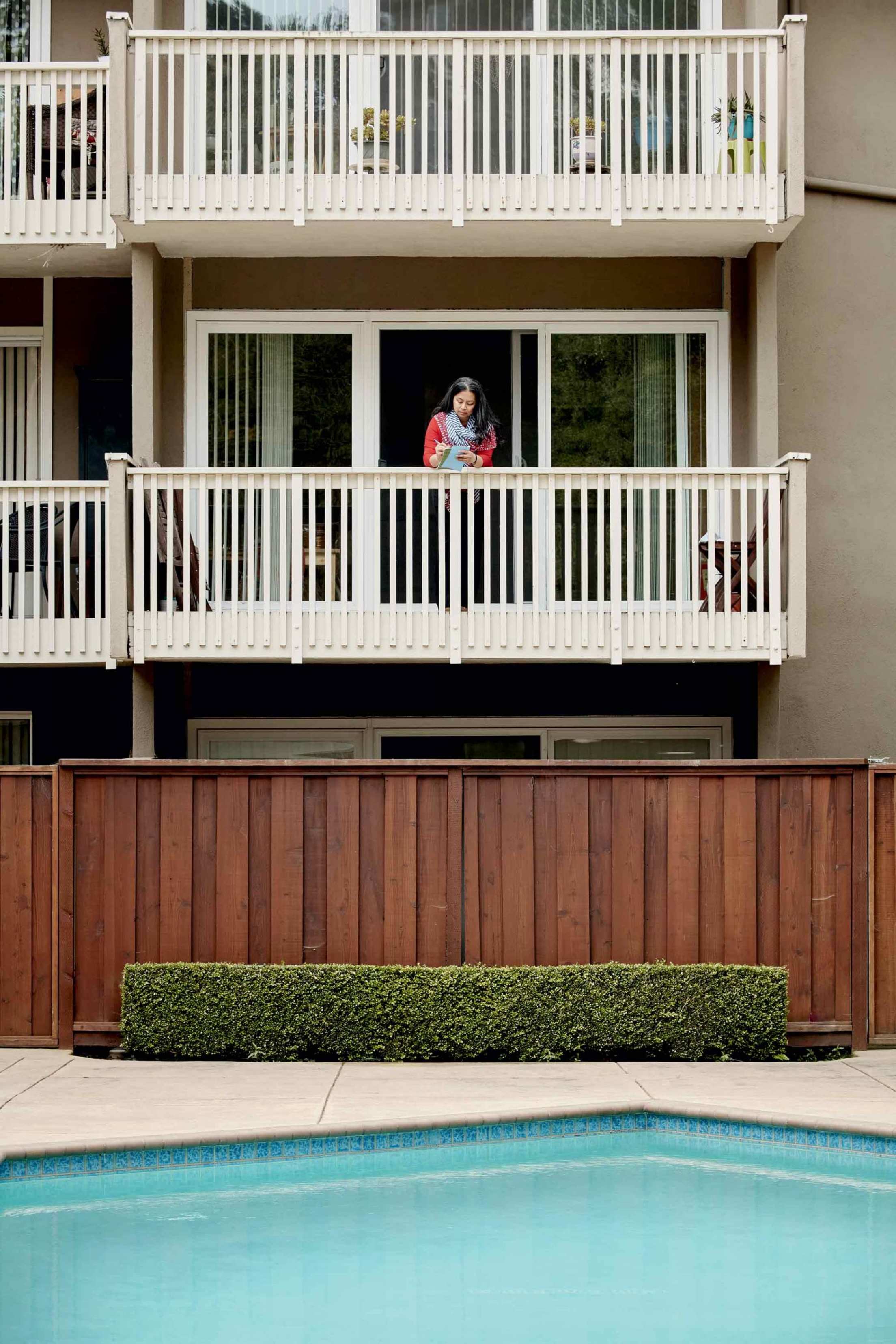
Trina Enriquez finds a place for her inner homebody while sheltering in place.
Creating a New Routine With Trina Enriquez
The first two weeks of sheltering in place were the most bewildering.
The abrupt upending of routine, the sudden uncertainty of livelihood, the news seeming more foreboding by the hour, the worry for loved ones—all of it swirled together in a perfect storm of anxiety. The loss of control was tough.
Then it occurred to me: Isn't this sense of disorientation and how we adapt to it some of the best of what travel is about? After all, I thought, my loved ones are still OK. I am, for the time being, employed. And while I can't control the news, I can regulate what I decide to do about it.
Creating a new routine was key, not only to avoiding that vortex of worry, but also to providing a sense of structure and order for these strange days. So I still got up before dawn, but instead of heading to work, I'd go walk in the surrounding hills and take note of, say, the scent of jasmine on the breeze or the sight of a hummingbird zipping from bloom to bloom. My partner and I also began watching the sunrise, relishing its warm glow, and later strolling along nearby tidal sloughs to observe shorebirds go about their lives as though nothing were amiss.
Sheltering in place also made space for all the homebodying my introverted heart could desire: more exercise, reading new books, streaming more documentaries and arts performances online. I made time to donate blood, to feel I could contribute something positive amid the bad news.
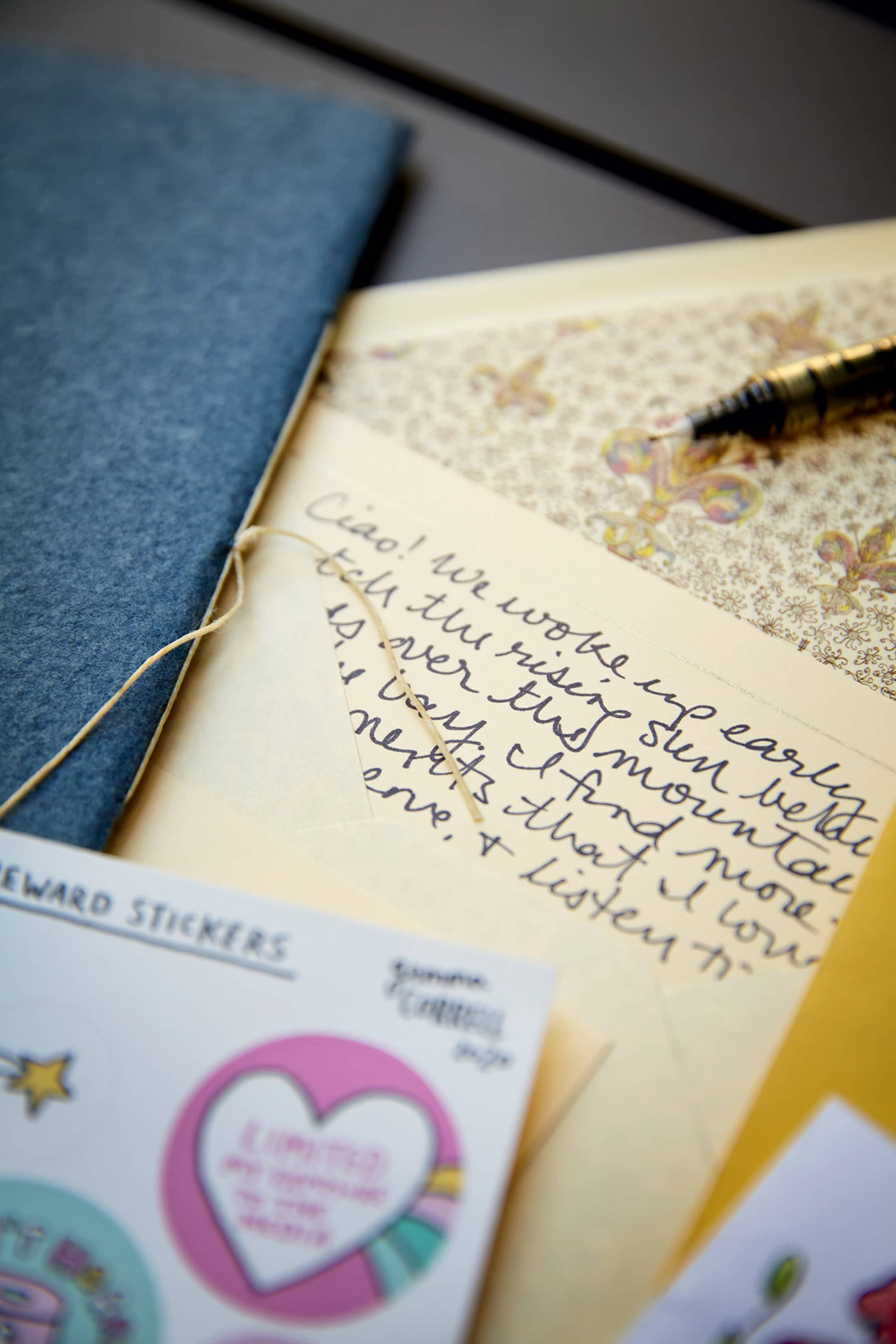
Simple pleasures: scrapbook material and letter writing.
Best of all, I had more time to spend on the letter writing and mail art I love, embracing both as a material way to stay connected with friends and family and as a fun way to express myself creatively. I scrapbooked! I journaled! In other words, I made sense of feeling so intensely housebound in the same ways I would help myself feel more grounded in any new place. I made a point of trying something novel every day, no matter how small. I vowed to reflect on the moment but also to revel in what simple pleasures could be had.
I still long to savor all that life offers, locally and globally—to dine at restaurants with friends, however physically distanced, and to listen to the plangent sound of waves on California's rocky coast. A late-summer sojourn to Italy is now up in the air—we'll see how the situation unfolds over the coming weeks—and I hold out hope of exploring Lassen Volcanic National Park in California for the first time, too, once the park fully reopens. But regardless of what happens, I feel determined to prove, if only to myself, that a full life, brimming with love and adventure and new experiences, can be found at home as well as on the road.
Trina Enriquez lives in the San Francisco Bay Area, and her writing has appeared in Sunset.
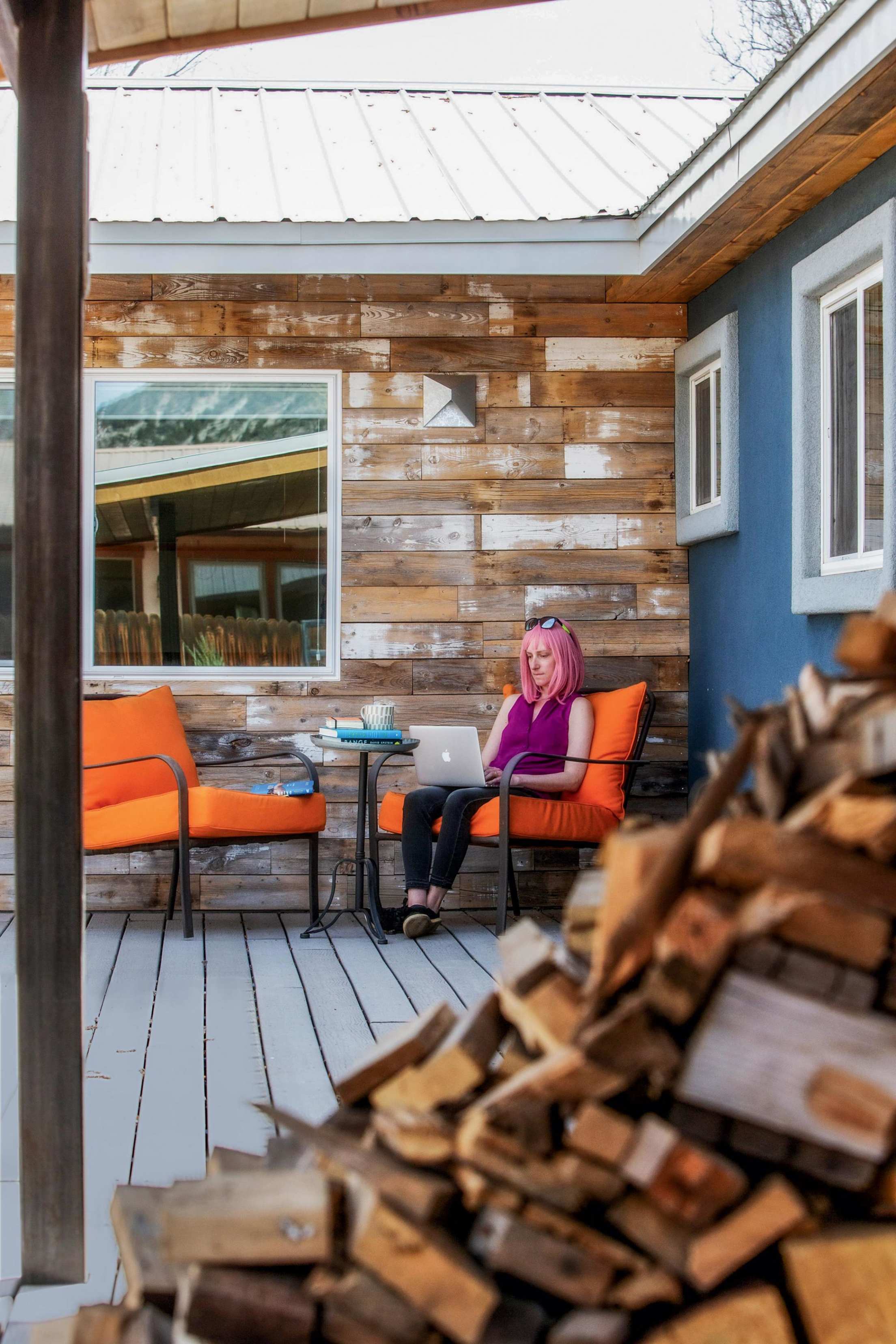
With less work, Kate Siber finds new ways to unleash her creative spirit.
Embracing the Crazy With Kate Siber
It's 10:30 a.m. on a Friday and I have already fixed myself an omelet, talked with friends on Zoom, baked an apple pie, eaten much of that pie, and finally sat down to write—all while wearing a pink wig, because why not?
This is my life during the time of Covid-19—a mixture of the monotonous and the absurd. Normally in spring I would be road-tripping from my home in Durango, Colorado, all over the Southwest and beyond—hiking, skiing, backpacking, photographing, and writing. But because of Colorado's stay-at-home order, I am barely leaving my house, let alone the county.
At first, I felt a sense of residual busyness as the lumbering machinery of my life came to a halt. But soon, with less work, volunteering, socializing, and traveling, great expanses of time opened up. That bounty of hours has allowed for visits from some interesting old friends.
Anxiety, for one. I'm blessed to have a stable home and plenty of food, but I'm heartbroken for my community and the world—the people who are ill, out of work, or one paycheck away from ruin. It's hard to know the best way to help.
In the abundance of time, my creativity, which is so often channeled into travel, has been resurfacing in new ways. I have started to write essays just for myself. I took a watercolor class online. I'm making collages and donning more creative—one might say eccentric—outfits. (Cue the pink wig.)
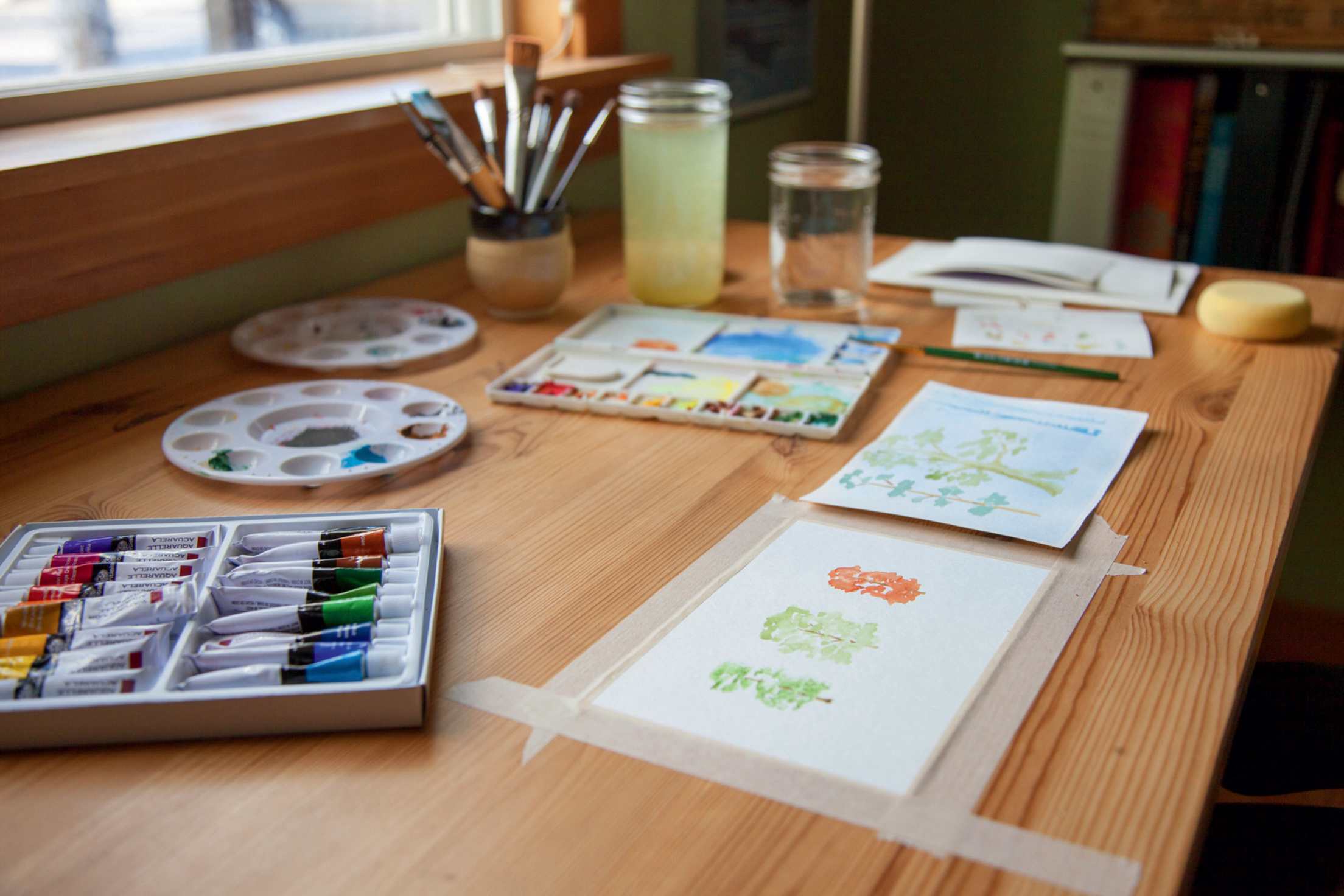
An online watercolor class is an outlet for Siber.
Even my daydreams have changed. I think of all the amazing dishes I'm going to make for neighborhood dinner parties when the pandemic is over. I fantasize more extravagantly than ever about travel—maybe a months-long road trip up the Rocky Mountains into Canada, hitting every great hike and swimming hole along the way, or a grand wine-soaked European tour with my husband that includes a minimum of one gelato or pastry a day.
It seems my neighbors are getting inventive too (or maybe just plain loopy). I spotted an older gentleman joyriding his vintage John Deere tractor at breakneck speed around town, and a pod of boys playing some hybrid of lacrosse and polo on baby tricycles—maintaining proper distance, of course.
These long hours have also offered the opportunity to turn inward. I find myself listening more deeply to the rhythms of my own being, which are usually drowned out by the demands of a busy life. These days, when I feel tired, I actually lie down instead of powering through another project. When I feel restless, I take myself on a walk like a beloved dog.
That finer attunement to my inner landscape has in turn heightened my awareness and enjoyment of the world around me—of such simple things as the birds flitting between trees in my backyard, the deer ambling by, the sounds of the river rising with spring snowmelt. I don't know if I will take this enhanced capacity to listen with me into the post-pandemic future, but I'm in no hurry to leave that part behind—whether I wind up going on that amazing Rocky Mountain road trip or not.
Kate Siber lives in Durango, Colorado, and contributes to Outside, Preservation, and National Parks.